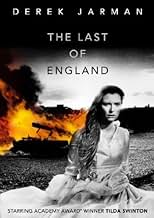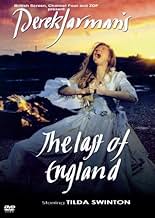IMDb RATING
6.4/10
1.6K
YOUR RATING
The artist's personal commentary on the decline of his country in a language closer to poetry than prose. A dark meditation on London under Thatcher.The artist's personal commentary on the decline of his country in a language closer to poetry than prose. A dark meditation on London under Thatcher.The artist's personal commentary on the decline of his country in a language closer to poetry than prose. A dark meditation on London under Thatcher.
- Awards
- 4 wins total
'Spring' Mark Adley
- Spring
- (as Spring)
- …
Jonny Phillips
- Various roles
- (as Jonathan Phillips)
Nigel Terry
- Narrator
- (voice)
Derek Jarman
- Self
- (uncredited)
- Director
- Writer
- All cast & crew
- Production, box office & more at IMDbPro
Featured reviews
This film seems to be a bizarre hybrid of David Lynch at his most weirdest and Jim Jarmush on an acid trip. There is no linear progression or any character development. Or any real characters when I think about it. Or story. Just a very strange mixture of disgusting visuals and gay imagery.
For the first half of the movie we linger on a bunch of hobos in a demolished wasteland. We can't really tell if they are just living in an old factory or if the world has been destroyed by nuclear apocalypse. These scenes are tinted (or flooded) by either red, green or blue. The guys just walk around and stuff. Nothing special.
I don't know why I didn't walk out of this movie. Obviously some part of it held my attention. I don't know what though. What's even stranger is that I WOULD recommend this film to others. If you like movies it's a good idea to see a few bizarre ones. If you don't like it that's fine. But I bet you can't fully explain WHY you don't like it. I can't explain why I even sat thru it.
It's good to see. Even though it doesn't have the normal things associated with movies. IE script, producer and well I dunno. Not much dialogue either.
For the first half of the movie we linger on a bunch of hobos in a demolished wasteland. We can't really tell if they are just living in an old factory or if the world has been destroyed by nuclear apocalypse. These scenes are tinted (or flooded) by either red, green or blue. The guys just walk around and stuff. Nothing special.
I don't know why I didn't walk out of this movie. Obviously some part of it held my attention. I don't know what though. What's even stranger is that I WOULD recommend this film to others. If you like movies it's a good idea to see a few bizarre ones. If you don't like it that's fine. But I bet you can't fully explain WHY you don't like it. I can't explain why I even sat thru it.
It's good to see. Even though it doesn't have the normal things associated with movies. IE script, producer and well I dunno. Not much dialogue either.
Reading the comments on this film or others like it is a frustrating experience, because so many people don't seem to be clear on the concept. Let me put it very simply:
This. Is. Not. A. Narrative. Film.
If you're going to complain about lack of a plot, character development, or other features of narrative films, don't go see a non-narrative film! It's an entirely different experience, and that's the whole idea. Judging an experimental montage of images and music and voice by the standards of a conventional narrative film is ridiculous -- like complaining about a drama because it wasn't funny. It's not SUPPOSED to be. If you don't like films that don't have a conventional narrative, don't see them.
So, for those who DO actually like experimental, non-narrative film, I'd highly recommend this one -- it's one of my all-time favourite films of any sort, even though know the majority of the population probably couldn't sit through it. I found it incredibly powerful, evocative and visually stunning, and even 15 years after seeing it, some images from it are still burned into my mind. I'm a big fan of Jarman's work in general, but if I had to pin down one single favourite from his work, I think this would be it.
This. Is. Not. A. Narrative. Film.
If you're going to complain about lack of a plot, character development, or other features of narrative films, don't go see a non-narrative film! It's an entirely different experience, and that's the whole idea. Judging an experimental montage of images and music and voice by the standards of a conventional narrative film is ridiculous -- like complaining about a drama because it wasn't funny. It's not SUPPOSED to be. If you don't like films that don't have a conventional narrative, don't see them.
So, for those who DO actually like experimental, non-narrative film, I'd highly recommend this one -- it's one of my all-time favourite films of any sort, even though know the majority of the population probably couldn't sit through it. I found it incredibly powerful, evocative and visually stunning, and even 15 years after seeing it, some images from it are still burned into my mind. I'm a big fan of Jarman's work in general, but if I had to pin down one single favourite from his work, I think this would be it.
Jarmen manages to create a world stinging from Thatcherite policies, with viscious imagery burning on the screen. If you want an indictment of the eighties without irony loaded sentimentality or crass stereotypes, then experience The Last of England.
This is the sort of movie which is usually defended with a phrase such as 'Oh you clearly didn't understand' or 'It's narrative is too unorthodox'. The sad fact is the film's limited distribution is due to its own wretched pretensions rather than its intelligence. A barrage of depressing images (man shoots up, man humps portrait of woman and so on) and an endless meandering dialogue is not enough to make a film involving. Jarman's intention is clear, Thatcher's Britain was every bit as horrible as it is shown to be here but surely there were better ways to articulate that. His work remains infuriating rather than involving and for that reason alone this film must be judged a failure.
The other day was Derek Jarman's birthday. I discovered him last year because I really like independent cinema, particularly from the fringes of society, and his name came up repeatedly. So on a whim, I bought "The Last of England". When BFI described him as a "queer pagan punk" for his birthday, I knew it was time to put that movie on and give it a whirl. It was a wholly unexpected, but mostly pleasurable, experience.
"The Last of England" is a highly personal bitch fest about the state of the country and even the world as it was in the mid 80s. Jarman was English and was reacting to life under the Thatcher rule, while I was an American living under Reagan rule. I think more than anytime before or since, the English and American experiences coincided culturally in the 1980s. Jarman's film was shot in 8mm, shaky cam and all, and is more or less and decoupage of raw emotions and experiences of growing up in the cold war, never knowing when the bombs will drop, and being led by leaders who seem to think such a state of constant anxiety is sane. Add to it, the newly emerging queer revolution and the punk scene, complete with drugs, and life at the time did seem quite precarious.
I loved the odd stream of consciousness, the nightmare visions, the lack of dialog or plot or even characters. Well, OK, I loved about 2/3 of it. The last 15 minutes which was where Tilda Swinton came in with her wedding gown made the least sense to me and could have been cut with no loss (which pains me to say as I admire her, but here she was like an extra at the last moment to add time and a name to the film, which was already quite intriguing). I enjoyed how he merged past with home family videos with present and future. I'm glad to have the film and I will certainly look for more by Jarman, though he is clearly not going to be everyone's cup of tea.
"The Last of England" is a highly personal bitch fest about the state of the country and even the world as it was in the mid 80s. Jarman was English and was reacting to life under the Thatcher rule, while I was an American living under Reagan rule. I think more than anytime before or since, the English and American experiences coincided culturally in the 1980s. Jarman's film was shot in 8mm, shaky cam and all, and is more or less and decoupage of raw emotions and experiences of growing up in the cold war, never knowing when the bombs will drop, and being led by leaders who seem to think such a state of constant anxiety is sane. Add to it, the newly emerging queer revolution and the punk scene, complete with drugs, and life at the time did seem quite precarious.
I loved the odd stream of consciousness, the nightmare visions, the lack of dialog or plot or even characters. Well, OK, I loved about 2/3 of it. The last 15 minutes which was where Tilda Swinton came in with her wedding gown made the least sense to me and could have been cut with no loss (which pains me to say as I admire her, but here she was like an extra at the last moment to add time and a name to the film, which was already quite intriguing). I enjoyed how he merged past with home family videos with present and future. I'm glad to have the film and I will certainly look for more by Jarman, though he is clearly not going to be everyone's cup of tea.
Did you know
- ConnectionsEdited from The Queen Is Dead (1986)
- SoundtracksRefugee Theme
Written by Barry Adamson
Performed by Barry Adamson & Martin McCarrick (as Martin Micarrick)
Produced by Barry Adamson
Barry Adamson appears courtesy of Dying Art Ltd
® & © Dying Art Ltd 1987
- How long is The Last of England?Powered by Alexa
Details
- Release date
- Countries of origin
- Language
- Also known as
- The Last of England - Verlorene Utopien
- Filming locations
- Production companies
- See more company credits at IMDbPro
Box office
- Budget
- £276,000 (estimated)
- Gross worldwide
- $630
- Runtime
- 1h 32m(92 min)
- Color
- Sound mix
- Aspect ratio
- 1.66 : 1
Contribute to this page
Suggest an edit or add missing content


























